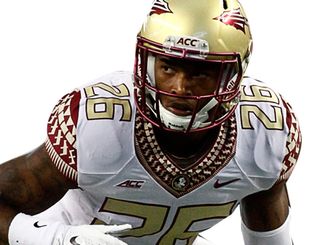Tackling the Big Guys Can Leave a Mark

As The New York Times delivers scoop after page-one, big-impact scoop on the seemingly special treatment given Florida State University football players by law enforcement, one might wonder how and why such high interest stories have gone largely unreported— or at least underreported— by the stations in Tallahassee. The newspaper stories—Pulitzer Prize bait on the leniency granted players involved in hit-and-run and domestic battery incidents, and the flawed investigation of an alleged rape involving Heisman Trophy winner Jameis Winston—have put Tallahassee, and its treatment of star athletes, under the national microscope. They’ve also left the stations there to play catch up.
Stan Sanders, news director at market leader WCTV, says FSU players don’t get special treatment from the station. “We don’t shy away when a player does something,” he says. “If something goes wrong [involving a player], we don’t bury it. We lead with it.”
The stations getting beaten on local stories by a national outlet is largely a function of resources, say TV news veterans. The newsroom at Gray Television’s WCTV has less than 30 people, notes Sanders. Tallahassee is the state capital, which eats up newsgathering chips. (There was also a fatal shooting involving FSU students on Nov. 20.) “The resources for covering the market are limited compared to a national outlet,” says Mark Effron, a veteran TV news executive. “Every news director must balance their resources with the stories that are important.”
News managers who have worked in Columbus (Ohio), South Bend (Ind.) and other markets where the college team is toast of the town say negative stories about the players can be widely unpopular. Residents have deep emotional connections to the universities, which are massive local economic drivers. “Nobody congratulates you when you take on the big local university,” says Al Tompkins, Poynter Institute senior faculty, broadcast and online. “People are not really happy with you.”
In those kinds of markets, aggressive reporting can jeopardize a news outlet’s access to the team. “They may not like to ask the tough questions,” says Steve Schwaid, VP of digital strategy at media consulting firm CJ&N, and a local TV news veteran. “You hear things like, they won’t talk to me next time, or, I won’t be able to sit in the press box.”
Sanders says his mandate at WCTV has always been to be fair, accurate and balanced, with no exemptions for star athletes.
Print Gets the Scoops
Broadcasting & Cable Newsletter
The smarter way to stay on top of broadcasting and cable industry. Sign up below
Tallahassee is DMA No. 106. CBS affiliate WCTV commands the lion’s share of local revenue, ahead of Southern Broadcasting Corp.’s ABC outlet WTXL. WTXL did not return a call for comment.
Local media has broken major stories related to local college sports teams, such as Harrisburg (Pa.)’s Patriot-News reports on former Penn State coach Jerry Sandusky’s child molesting. “But you don’t find many examples of television breaking these stories,” says Tompkins.
Comments on WCTV’s Facebook page show the challenge of reporting on FSU stars’ off-field actions. Those critical of players’ behavior are frequently dismissed as “haters” or, worse, fans of the rival Florida Gators.
Sanders says the WCTV newsroom will continue to be aggressive on FSU stories. “I don’t know of any news organization in America,” he says, “that gets every story every day.”
POYNTER ISSUES TIPS FOR GRAND JURY REPORTING
Reporters covering grand jury hearings, such as that in Ferguson, Mo., may be well served by a new primer on grand juries at Poynter.org that Al Tompkins, senior faculty of broadcast and online at the Poynter Institute, has authored. It’s titled, appropriately enough, “What journalists covering Ferguson need to know about grand juries.”
Tompkins has covered many grand jury hearings in his career, yet still found the process perplexing. “The more I read, the more I understood that I didn’t understand everything I need to know,” he says.
The essay details the differences between grand and petit juries as well as grand juries and preliminary hearings, and dives into the nuances of grand juries in Missouri. “All of these things are critically important in this case,” says Tompkins.
Michael Malone, senior content producer at B+C/Multichannel News, covers network programming, including entertainment, news and sports on broadcast, cable and streaming; and local broadcast television. He hosts the podcasts Busted Pilot, about what’s new in television, and Series Business, a chat with the creator of a new program, and writes the column “The Watchman.” He joined B+C in 2005. His journalism has also appeared in The New York Times, The Philadelphia Inquirer, Playboy and New York magazine.

